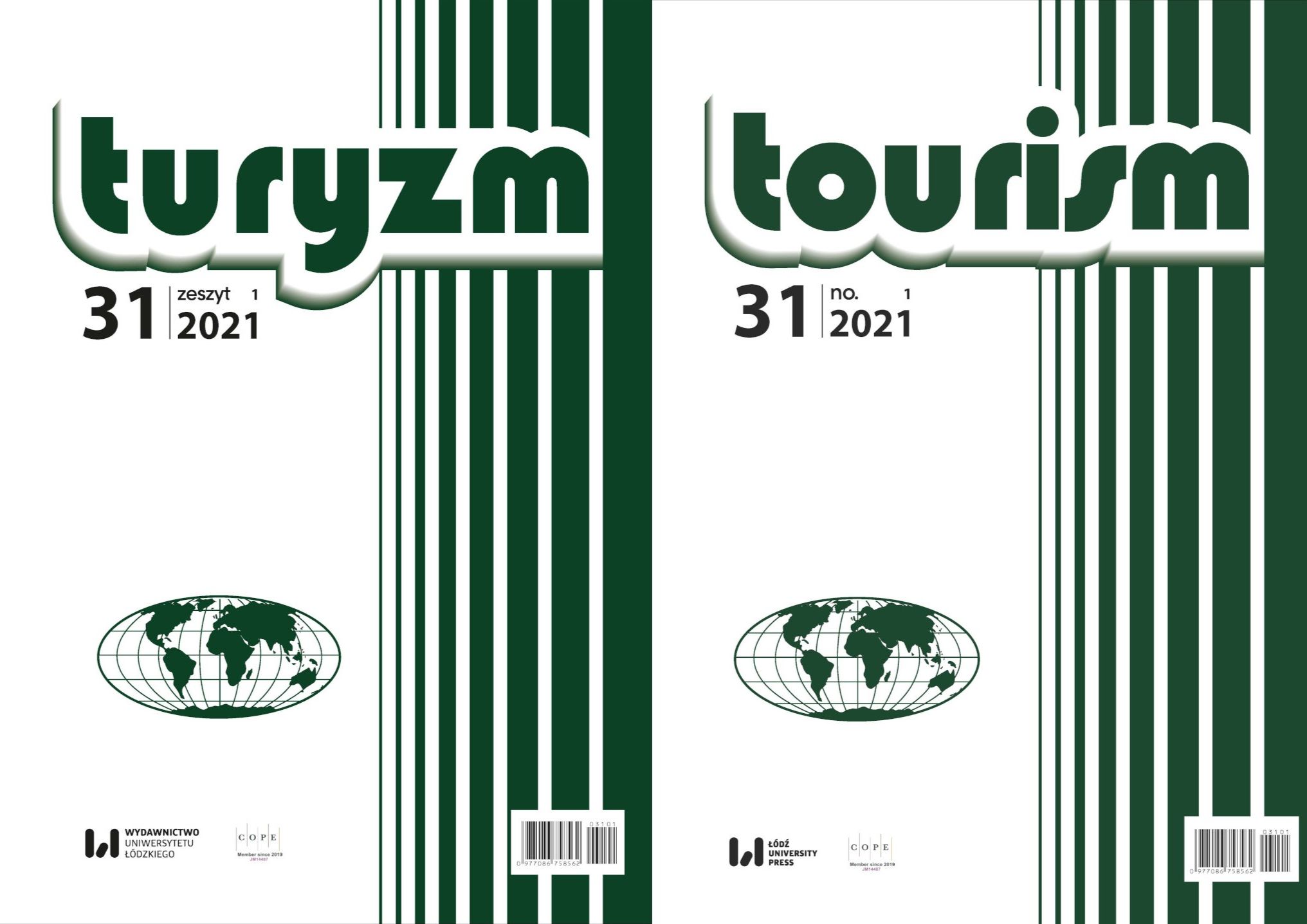The potential of location-based gamification apps for promoting Sofia as a tourist destination
DOI:
https://doi.org/10.18778/0867-5856.31.1.13Słowa kluczowe:
gamification, app, tourism, destination, SofiaAbstrakt
The main aim of the research is to identify the potential of location-based gamification apps for promoting tourist destinations. The specific goal is to investigate and evaluate the existing gamified apps for Sofia and reveal their potential as a marketing tool for enhancing the capital as a tourist destination. The study is based on a literature review on the topic and desk research of the available location-based gamification apps for promoting Sofia as a tourist destination thus allowing a comparative analysis of the main attributes of the gamified apps to be made. The qualitative research technique of using key informants is also applied, providing an expert source of information and a deeper insight into current and potential practices in the research area and their effectiveness. The results indicate that this has the greatest potential for further engagement of users and the co-creation of products and services as well as for raising awareness of the destination. The main limitations are related to the fact that they are a relatively new and little-known marketing tool in the field of tourism, and this predetermines a lack of sufficient knowledge and experience for their use for promotional purposes.
Pobrania
Bibliografia
About Questo (2021). Retrieved from: https://questoapp.com/about (24.01.2021).
Google Scholar
Chapman, A., Light, D. (2016). Exploring the tourist destination as a mosaic: The alternative lifecycles of the seaside amusement arcade sector in Britain. Tourism Management, 52, 254–263. https://doi.org/10.1016/j.tourman.2015.06.020
Google Scholar
DOI: https://doi.org/10.1016/j.tourman.2015.06.020
Correa, C., Kitano, C. (2015). Gamification in tourism: Analysis of Brazil Quest Game. e-Review of Tourism Research, 6, 1–5.
Google Scholar
Deci, E.L., Ryan, R.M. (1985). Cognitive evaluation theory. In: E.L. Deci , R.M. Ryan, Intrinsic motivation and self-determination in human behavior. Perspectives in social psychology (pp. 43–85). Boston: Springer. https://doi.org/10.1007/978-1-4899-2271-7_3
Google Scholar
DOI: https://doi.org/10.1007/978-1-4899-2271-7_3
Deterding, S., Dixon, D., Khaled, R., Nacke, L. (2011). From game design elements to gamefulness: Defining “gamification”. In: MindTrek '11: Proceedings of the 15th international academic MindTrek conference: Envisioning future media environments (pp. 9–15), September 2011. https://doi.org/10.1145/2181037.2181040
Google Scholar
DOI: https://doi.org/10.1145/2181037.2181040
Discover Sofia (2021). Retrieved from: https://www.secretcitytrails.com/product-category/discover-sofia/ (12.01.2021).
Google Scholar
Groh, F. (2012). Gamification: State of the art definition and utilization. In: Proceedings of the 4th seminar on research trends in media informatics (pp. 39–46). 14th February 2012.
Google Scholar
Hofacker, C.F., De Ruyter, K., Lurie, N.H., Manchanda, P., Donaldson, J. (2016). Gamification and mobile marketing effectiveness. Journal of Interactive Marketing, 34, 25–36. https://doi.org/10.1016/j.intmar.2016.03.001
Google Scholar
DOI: https://doi.org/10.1016/j.intmar.2016.03.001
Maan, J. (2013). Social business transformation through gamification. International Journal of Managing Information Technology, 5 (3), 9–16. https://doi.org/10.5121/ijmit.2013.5302
Google Scholar
DOI: https://doi.org/10.5121/ijmit.2013.5302
Marinov, V. (2005). Partners for development. Partnership model for strategic planning of local development. Sofia: ECIP.
Google Scholar
Marinov, V. (2012). Key informants’ analysis of small scale tourism development in mountain villages. In: SEEmore conference: Mountain resources and their response to global change (abstracts) (pp. 27–28). Ankara University, Turkey.
Google Scholar
Marinov, V., Dogramadjieva, E., Assenova, M., Petkova, E., Baikov, B. (2015). Tourism product development and marketing of Sofia metropolitan area: Business perceptions and priorities. In: I. Tózsa, A. Zátori (eds), Metropolitan tourism experience development (pp. 51–67). Budapest: Corvinus University of Budapest.
Google Scholar
Marshal, M.N. (1996). The key informant technique. Family Practice, 13 (1), 92–97. https://doi.org/10.1093/fampra/13.1.92
Google Scholar
DOI: https://doi.org/10.1093/fampra/13.1.92
Negruşa, A.L., Toader, V., Sofică, A., Tutunea, M.F., Rus, R.V. (2015). Exploring gamification techniques and apps for sustainable tourism. Sustainability, 7 (8), 11160–11189. https://doi.org/10.3390/su70811160
Google Scholar
DOI: https://doi.org/10.3390/su70811160
Neuhofer, B., Buhalis, D., Ladkin, A. (2012). Conceptualising technology enhanced destination experiences. Journal of Destination Marketing & Management, 1 (1–2) , 36–46. https://doi.org/10.1016/j.jdmm.2012.08.001
Google Scholar
DOI: https://doi.org/10.1016/j.jdmm.2012.08.001
Nexto (2021). Retrieved from: https://nexto.io/ (13.01.2021).
Google Scholar
Schell, J. (2008). The art of game design: A book of lenses. Pittsburgh: CRC Press.
Google Scholar
DOI: https://doi.org/10.1201/9780080919171
Seaborn, K., Fels, D.I. (2015). Gamification in theory and action: A survey. International Journal of Human-Computer Studies, 74, 14–31. https://doi.org/10.1016/j.ijhcs.2014.09.006
Google Scholar
DOI: https://doi.org/10.1016/j.ijhcs.2014.09.006
Secretcitytrails (2021). Retrieved from: https://www.secretcitytrails.com/ (12.01.2021).
Google Scholar
Serdica Riddles (2021). Retrieved from: https://www.facebook.com/SerdicaRiddles/ (21.01.2021).
Google Scholar
Sever, N., Sever, G., Kuhzady, S. (2015). The evaluation of potentials of gamification in tourism marketing communication. International Journal of Academic Research in Business and Social Sciences, 5 (10), 188–202. https://doi.org/10.6007/IJARBSS/v5-i10/1867
Google Scholar
DOI: https://doi.org/10.6007/IJARBSS/v5-i10/1867
Swacha, J., Ittermann, R. (2017). Enhancing the tourist attraction visiting process with gamification: Key concepts. Engineering Management in Production and Service, 9 (4), 59–66. https://doi.org/10.1515/emj-2017-0031
Google Scholar
DOI: https://doi.org/10.1515/emj-2017-0031
Weber, J. (2014). Gaming and gamification in Tourism: 10 ways to make tourism more playful. Retrieved from: https://www.thinkdigital.travel/ (1.03.2021)
Google Scholar
Wu, L., Stilwell, M.A. (2018). Exploring the marketing potential of location-based mobile games. Journal of Research in Interactive Marketing, 12 (1), 22–44. https://doi.org/10.1108/JRIM-06-2017-0041
Google Scholar
DOI: https://doi.org/10.1108/JRIM-06-2017-0041
Xu, F., Buhalis, D., Weber, J. (2017). Serious games and gamification of tourism. Tourism Management, 60, 244–256. https://doi.org/10.1016/j.tourman.2016.11.020
Google Scholar
DOI: https://doi.org/10.1016/j.tourman.2016.11.020
Xu, F., Tian, F., Buhalis, D., Weber, J., Zhang, H. (2016). Tourists as mobile gamers: Gamification for tourism marketing. Journal of Travel and Tourism Marketing, 33 (8), 1124–1142. https://doi.org/10.1080/10548408.2015.1093999
Google Scholar
DOI: https://doi.org/10.1080/10548408.2015.1093999
Xu, F., Weber, J., Buhalis, D. (2014). Gamification in tourism. In: Z. Xiang, I. Tussyadiah (eds), Information and communication technologies in tourism (pp. 525–537). Cham: Springer. https://doi.org/10.1007/978-3-319-03973-2
Google Scholar
DOI: https://doi.org/10.1007/978-3-319-03973-2_38
Xu, Y. (2012). Literature review on web app gamification and analytics. Honolulu: University of Hawaii. Retrieved from: https://citeseerx.ist.psu.edu/viewdoc/download?doi=10.1.1.462.5228&rep=rep1&type=pdf (1.03.2021)
Google Scholar
Yang, Y., Asaad, Y., Dwivedi, Y. (2017). Examining the impact of gamification on intention of engagement and brand attitude in the marketing context. Computers in Human Behavior, 73, 459–469. https://doi.org/10.1016/j.chb.2017.03.066
Google Scholar
DOI: https://doi.org/10.1016/j.chb.2017.03.066
Zichermann, G., Cunningham, C. (2011). Gamification by design: Implementing game mechanics in web and mobile apps. Sebastopol: O’Reilly Media Incorporated.
Google Scholar
Pobrania
Opublikowane
Jak cytować
Numer
Dział
Licencja

Utwór dostępny jest na licencji Creative Commons Uznanie autorstwa – Użycie niekomercyjne – Bez utworów zależnych 4.0 Międzynarodowe.










